Repair it, reuse it: The people saving stuff from landfill
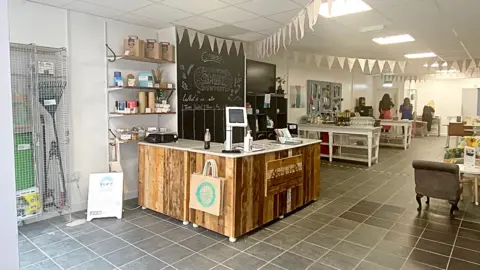 ReMake Newport
ReMake NewportWe've all got those items lying around the house - an appliance with a non-working part, a coat with a torn sleeve. Time to take them to the tip and buy another?
Not if ReMake Newport can help it. The first permanent repair café to open in Wales, it aims to be a real live Repair Shop at the heart of Newport's shopping centre, a counterpoint to the stores dedicated to consumption.
The new venture is funded by the voluntary sector charity WCVA, and run as a partnership between Repair Café Wales (RCW) and Benthyg, the "library of things", which offers items like household appliances and tools for rent at very low cost to users.
Their aim is simple. In a world of proliferating stuff, let's repair things when they go wrong and have shared items to borrow rather than every home owning multiple items they barely use.
'People who enjoy fixing stuff'
The "café" - which, as project manager Katie Bellaris is at pains to point out, does not actually sell food or drink - is open for repairs on Tuesdays, Thursdays and Saturdays, where people can get their things repaired for free.
However the café is not just about a one-time repair.
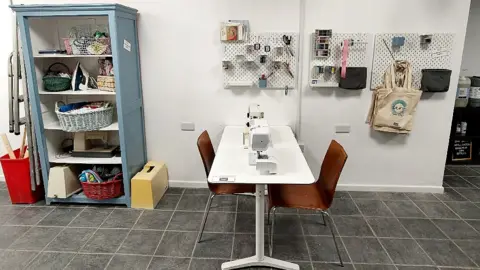 ReMake Newport
ReMake Newport"We ask that people that bring their household items in come and sit with the volunteer that's fixing it in order for them to gain the skills and upskill them in terms of what that fix entails," Katie explained.
"So they can go away with that skill and potentially do it themselves at a later date."
The repairs are all done by volunteers, who may be former tradespeople, hobbyists, or "just people who enjoy fixing stuff".
Any spare parts identified as necessary for the repair have to be sourced and paid for by the owner and there are never guarantees that every item brought in will be fixable.
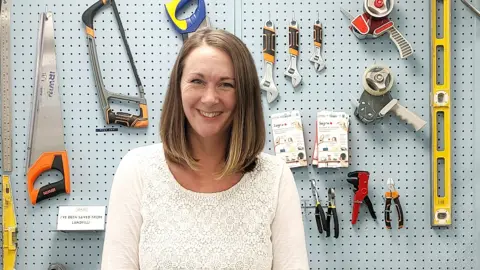 ReMake Newport
ReMake NewportKatie stresses they are not trying to take work away from local tradespeople either. The café is trying to work with them and signposting its users to them when a repair needs more expertise, or for work such as alterations on clothing rather than small repairs.
"We tend to take things such as small electrical appliances which if you were to take that to a professional repair shop, it would probably cost you more than it would to buy a new one," she said.
"We're just trying to be in that niche zone where we're extending life to products that would otherwise have been put into landfill."
Workshop training
A unique feature of this repair café is workshops to train local people how to carry out repairs as part of RCW's sharing skills and social cohesion aims.
Some will be run by regular volunteers but others by external organisations such as Ikea, which will deliver sustainability workshops for the café.
Another offers digital repair training with Laptops 4 Home Learning, a project set up by the Rotary Club in Uskmouth during the pandemic and now hosted by ReMake to provide renovated computers for pupils to access remote learning when schools closed.
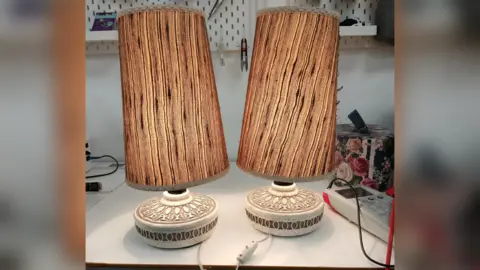 ReMake Newport
ReMake NewportThe last element of the café scheme is a "Repair it Yourself" membership which for a small monthly fee gives people access to tools, sewing machines and workshop space to carry out their own repairs.
The membership also gives people the right to borrow from the library of things, the side of the project managed by Francesca Williams.
Every household has items that are unused most of the time, as she points out.
"One of the craziest statistics around all this is that most drills only have a 17-minute lifespan in people's garages," she said.
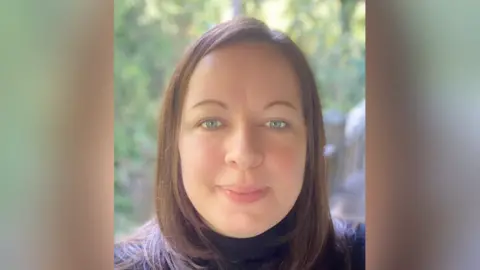 Francesca Williams
Francesca Williams"That's the life that they're used for and the rest of the time they sit on a shelf gathering dust.
"That's what we want to change. We want to make borrowing the new buying."
Members of the community can donate items they no longer need or want to the library, with a carpet cleaner currently being the most popular item on the books and "never in the the shop", according to Francesca.
The project has had its rent paid for the first year by its landlords at Newport City Homes, which is opening flats in the block above the store, an ideal source of customers for the library.
"We're hoping we will be a real 'come to' place for those [and other] residents to borrow things instead of buying them and if they've got items to be fixed that they'll pop downstairs and see us," she said.
ReMake is also looking at buying an e-bike to enable active travel to deliver rented goods to people who live further out and cannot go into the city centre so easily, as well as collect or deliver repaired items.

How much waste do we produce?
In the few weeks since the café opened, each repair session lasting three hours has mended an average of seven items each time.
Across Wales, the average pop-up repair café session saves between 10-20 items at a go. With 50 cafés running once a month in local community centres, the numbers of items saved from the tip can stretch into the thousands over the course of a year.

With about 600,000 tonnes of municipal waste in Wales to dispose of annually, Phil Hurst from the waste management charity Wastesavers is on a mission to make sure at least some of is diverted from landfill or burning and back out to the community.
This autumn the charity opened the latest of its eight reuse shops - literally, a shop full of second-hand goods saved at the last minute from going into the tip by eagle-eyed refuse workers - at Lamby Way Recycling Centre in east Cardiff.
Called the Cabin, it is full of things that people might look at and think, as Phil puts it: "We're never going to sell that on eBay", such as a cheese grater, for example, and bring to the tip to throw away.
But when they come to get rid of it, staff at the waste and recycling centre can divert it into the shop where it might be just the thing someone else needs.
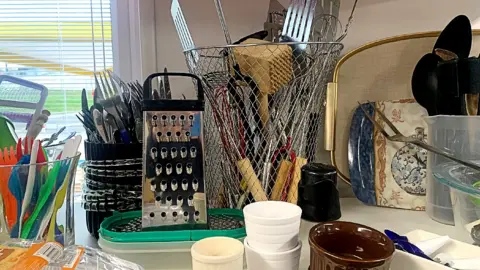
Indeed, it would be perfectly possible to stock a kitchen from the stuff rescued or donated. There's even a working slow cooker, as, unlike some other charity or recycling stores, all the tip shops have staff trained to PAT test electrical equipment and ensure they are safe and working before they go on sale, as well as providing a three-month guarantee.
The Cabin and its fellow tip shops are the other side of the equation from the repair cafés. While one seeks to keep things in use and in people's homes, the Cabin is there to sweep up the things that people no longer need or want, and divert them to a new owner.
As Phil explained: "We can clean things off but we don't mend things. We don't have the capacity or expertise to do that.
"It's complementary [to a repair café] and every community needs both. Our slogan is they should have a reuse shop at every tip in Wales."
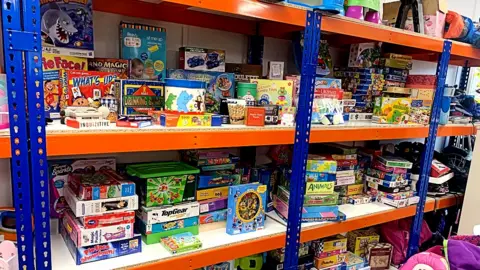
The Cabin and the other shops are run in conjunction with the local councils, which give them the space to operate in.
As well as direct tip rescues, people in the community can bring unwanted items straight in in the same way as they would to a charity shop on the high street.
Phil says it is not currently possible to take all the stuff people want to donate simply because of lack of room, adding: "If we had a warehouse here, we'd fill it," highlighting the mountain (possibly made of bric-a-brac) still to climb in dealing with the results of the consumer society we have built.
"People have huge volumes of kids' toys and plastic that are just sitting in attics. In the end they'll chuck it out," he points out.
"We sold 4-5,000 items a month from one shop. Everything gets monitored. We know everything we've got and the average weights of them and the council gets feedback .They know what tonnage is being saved."
'It's more than just the environment'
In September, the Cabin sold nearly 1,500 items, keeping a total of 50.3 tonnes of products out of tip skips.
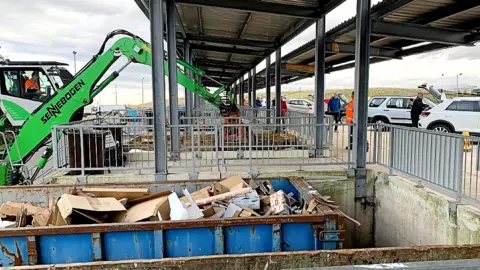
He sees three crucial aspects to any attempt to alter our relationship to waste through projects such as this. In a nutshell: "Environmental sustainability, social sustainability and economic sustainability."
While tip shops are not a new idea, in the past they may have been run on a shoestring, manned by volunteers and only open at certain times, according to Phil. The ones run by Wastesavers are open seven days a week.
"We make no qualms about it being a business, but all the profits go into our social inclusion programmes that we run," he said, while pointing out that the people who use the shops are much more likely to be managing on small incomes.
"It's more than just the environment," he said.
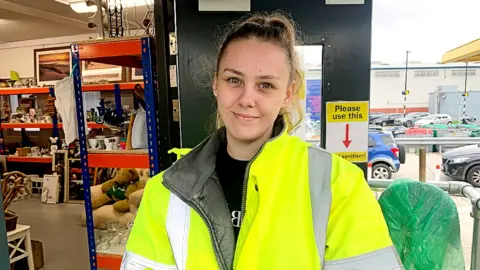
A case in point is its workforce. Cabin employs three staff, including 20-year-old Chloe Morgan who has come to the site via the Job Centre's Kickstarter programme on a sixth-month placement and is hoping to stay permanently once it ends.
Hers is one of 30 posts created across south Wales in the past four years, of whom a third were previously volunteers with the charity, while another 100 people currently volunteer.
For Chloe, the social nature of the project as well as its environmental one is evident even in the short time the Cabin has been open.
She talks of building a relationship with a woman who comes on repeat visits to get affordable DVDs for her grandson with learning difficulties, something she can relate to from personal experience.
She said: "We have so many people coming in, repeat customers. They come up one or two times a week."
As an elderly customer leaves, she calls out a farewell to Chloe by name.
'Treasure trove'
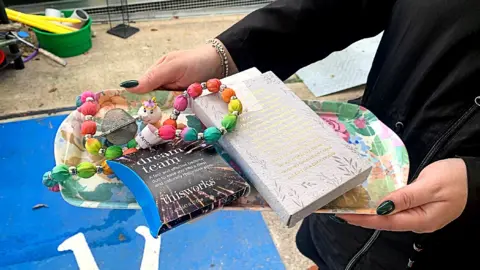
One of the fledgling regulars is Becky Williams, from the nearby suburb of Trowbridge. With three young daughters to buy for, she is full of enthusiasm for the site and the bargains to be had.
"It's about my fourth visit now. It's just good to reuse items rather than they go into landfill," she said.
"[On previous visits] I found some little walkie-talkie things which my twins love. They were only £2. I also found a cute handknit pumpkin for Halloween which I'll be able to reuse every year.
"It's the same way as charity shops really; you never know what you are going to find. It's like a treasure trove."

- FESTIVAL OF FUNNY : A whole host of humour to bring a smile, as the nights draw in
- BRAVO TWO CHARLIES : Police officers just trying to get the job done. And, broadly, failing

